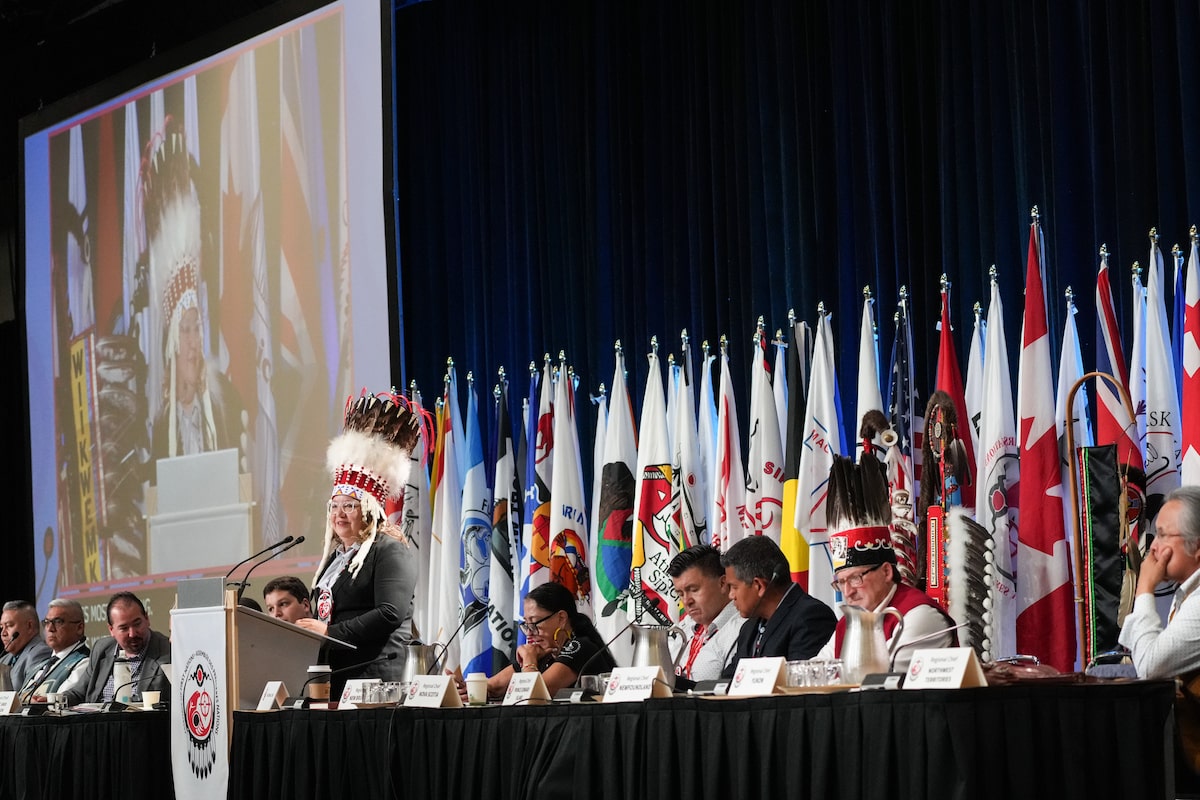National Chief Cindy Woodhouse Nepinak gives her opening address at the Assembly of First Nations annual general assembly in Montreal, July 9, 2024.Christinne Muschi/The Canadian Press
First Nations leaders say they will work to share their concerns with King Charles III over efforts by Ottawa and provincial governments to fast-track major resource projects and legislation without consultations and consent, calling them an attack on their treaty rights and nations.
Assembly of First Nations National Chief Cindy Woodhouse Nepinak and Algonquins of Pikwakanagan Chief Greg Sarazin will be part of a delegation of Indigenous leaders welcoming the King upon his arrival in Ottawa on Monday, as he prepares to read the Speech from the Throne to open Parliament on Tuesday.
The meeting will come after weeks of concern among First Nations over proposed legislation in British Columbia and Ontario. The bills are intended to expedite energy and infrastructure projects as a way of offsetting damage from U.S. President Donald Trump’s trade war, but the nations say the moves may trample their inherent and treaty rights over their lands. Prime Minister Mark Carney has likewise promised to fast-track approvals of resource projects.
Indigenous nations are also concerned about an Alberta bill that would make it easier for citizen groups to initiate provincial referendums, including possible votes on separation from Canada. Some First Nations in the province say this would violate treaties signed with the Crown.
Ms. Woodhouse Nepinak said she will stress to the King the need to denounce Mr. Trump’s tariffs and recognize historic border relationships that existed pre-Confederation.
She added that provinces are creating opposition and division in their jurisdictions by not taking Indigenous rights into consideration, and “writing legislative pieces without co-developing them with First Nations.”
“This country was made from treaties. I am the great-great-great granddaughter of Chief Richard Woodhouse, who signed the treaties here that we live in peace,” Ms. Woodhouse Nepinak said. She is from Pinaymootang First Nation, a signatory to Treaty 2 in Manitoba.
Treaty experts say asserting Crown sovereignty is about who has the ultimate law-making authority, not whether the Crown owns the land. Aboriginal title to land is protected under Section 35 of the Constitution, which also includes obligations of the Crown and its legal duty to consult, for example. Historic treaties were made pre-Confederation with the British monarchy, which later transferred Crown sovereignty to Canada through its federal and provincial governments.
B.C.’s senior First Nations leaders joined the Union of BC Municipalities on Thursday to demand the provincial government withdraw its proposed resource legislation, which would grant cabinet sweeping powers to fast-track major projects. The opponents warned that the province will face protests and litigation if it moves ahead with its plans.
The province introduced Bill 15, the Infrastructure Projects Act, in response to U.S. tariff threats, and says it is set to be passed into law by the end of May.
B.C. First Nations Summit political executive member Robert Phillips said the province is not following its own laws and framework that have been developed over the years. He said these would “enable us to work together to find a solution, to co-develop these laws, legislation, policies, procedures, regulations, that can actually then fast-track these projects that the Premier and potentially the Prime Minister do want to do.”
BC Regional AFN Chief Terry Teegee said there are similar threats happening in other provinces and jurisdictions that need to be conveyed to King Charles.
“We are very concerned about not only the province of B.C., but also other provinces in this country,” Mr. Teegee said, noting that First Nations want more discussion and consultation about major projects, “especially ones that transect many provinces across this country.”
In Ontario, Chief Archie Wabasse from Treaty 9 told a legislature committee that Bill 5, the Protecting Ontario by Unleashing Our Economy Act, “paves the way for unchecked development, threatens environmental protections, and ignores the spirit and intent of our treaties.”
Lake Huron Regional Chief Scott McLeod said the bill was introduced without any consultation or consent from First Nations, breaching Section 35 of the Constitution and ignoring the Crown’s duty in legally binding treaty obligations.
He likened the bill and First Nations’ united front against it to the beginnings of Idle No More, a massive grassroots movement that grew across the country in 2012 in response to legislation that threatened Indigenous rights.
“Just sayin…be ready Nishes,” a post on Mr. McLeod’s Facebook account reads. “Nishes” is slang for Anishinaabe, one of the nations in Ontario.
In Alberta, Treaty Nations 6, 7 and 8 have organized their opposition in recent weeks to Premier Danielle Smith’s proposed amendments on referendums.
With a report from Justine Hunter
